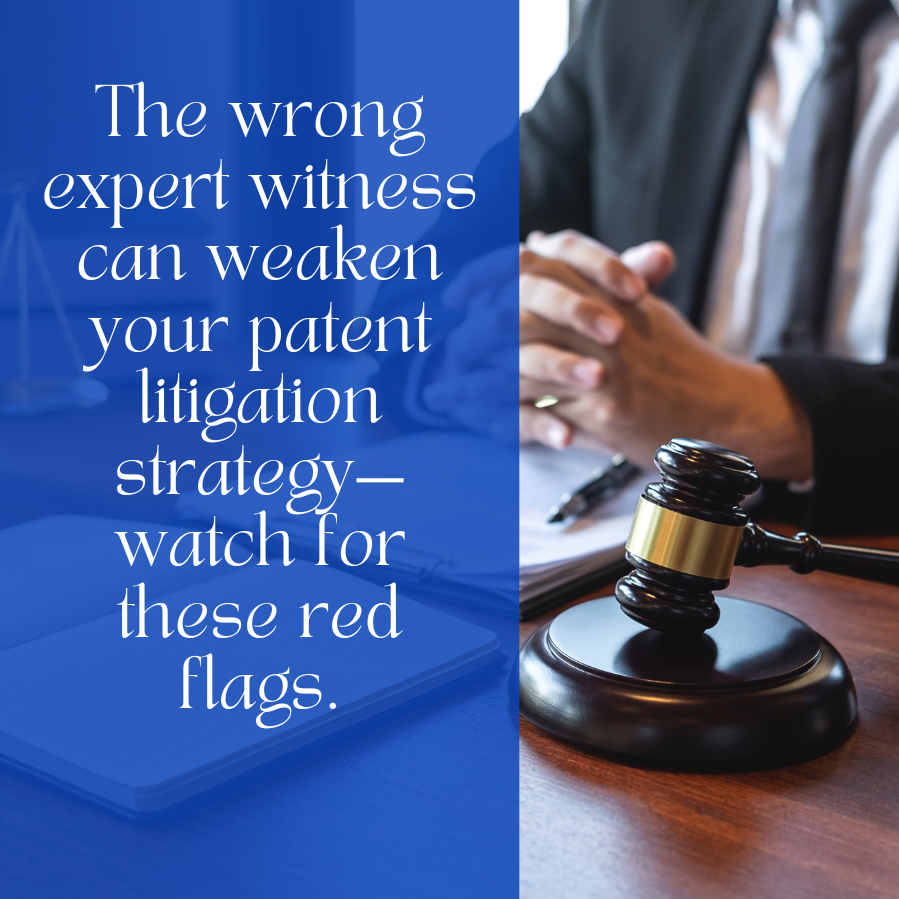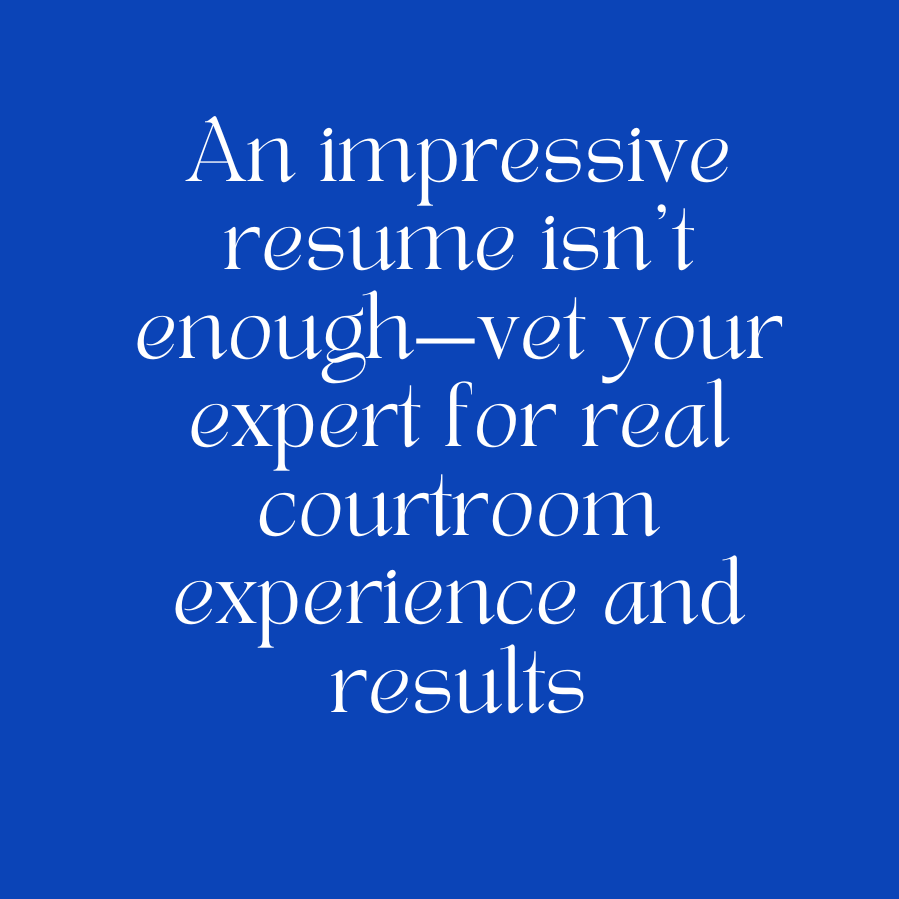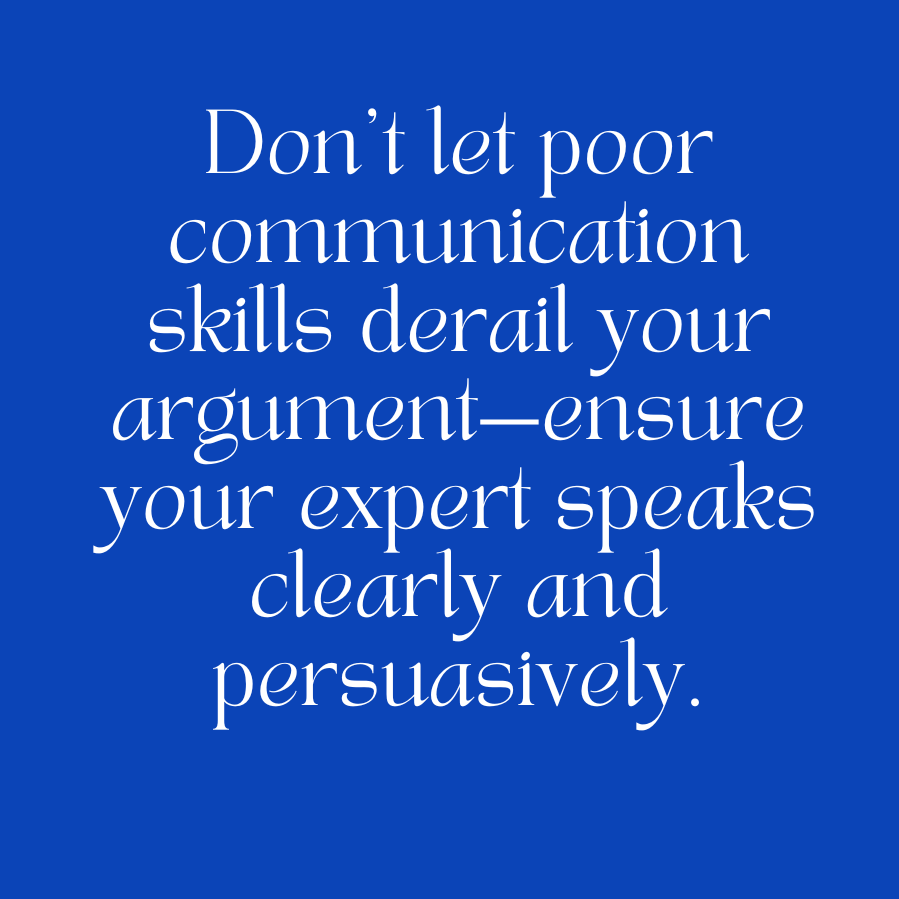5 Red Flags When Hiring Expert Witnesses for Patent Litigation
Hiring the right expert witness in patent litigation can mean the difference between success and failure. As an attorney, you understand the stakes—an unqualified or unreliable expert can unravel months of preparation in a single cross-examination. But how can you ensure you’re making the right choice? Identifying potential red flags early in the hiring process is critical to protecting your case and avoiding costly mistakes.
In this article, we’ll explore five key red flags to watch for when hiring expert witnesses for patent litigation, offering practical insights and strategies to help you make informed decisions.
Why Expert Witnesses For Patent Litigation Are Critical
Patent litigation often involves complex technologies, intricate legal arguments, and high financial stakes. Expert witnesses for patent litigation play a pivotal role in:
Interpreting patent claims and technical details.

Evaluating infringement and validity issues.
Presenting damages assessments or economic analyses.
However, the wrong expert can undermine your arguments, leading to credibility issues and adverse rulings. By recognizing red flags during the selection process, you can ensure your expert strengthens your case rather than weakening it.
The 5 Red Flags to Watch For When Hiring Expert Witnesses
1. Lack of Relevant Expertise
An expert with a general background in the field may seem qualified at first glance, but patent litigation demands highly specific expertise.
Why It Matters: Patent cases often involve niche technologies or methodologies. An expert without deep knowledge of the subject matter may struggle to provide credible analysis or withstand cross-examination.
Example: In one notable case, a generalist engineer was hired to testify on semiconductor technology. During cross-examination, the expert’s lack of familiarity with the specific processes involved was exposed, leading to a significant weakening of the client’s position.
2. Inconsistent or Flawed Methodologies
Experts must rely on sound, consistent methodologies that align with industry standards and legal requirements.
Red Flag: An expert who cannot explain their methods clearly or whose analysis deviates from accepted practices risks having their testimony excluded.
Practical Tip: Request a detailed explanation of their approach during the vetting process and review prior reports or testimony for consistency.
3. History of Bias or Conflicts of Interest
Even the appearance of bias can damage an expert’s credibility. Attorneys must screen for potential conflicts of interest, such as:
Prior work with the opposing party.
A pattern of always testifying for one side (e.g., only for plaintiffs or defendants).
Financial ties that could raise questions about impartiality.

Case Insight: In one litigation, an expert’s previous consultancy for the opposing party came to light during the trial, leading to accusations of bias and diminished credibility.
4. Poor Communication Skills
Technical expertise is essential, but an expert who cannot clearly explain their findings to a judge or jury will fail to be persuasive.
Red Flag: Overly technical language, a lack of confidence during mock testimony, or difficulty simplifying complex concepts for lay audiences.
Solution: Conduct interviews or mock cross-examinations to assess their ability to communicate effectively and maintain composure under pressure.
5. Limited Courtroom Experience
Even the most qualified expert can falter in court if they lack litigation experience.
Red Flag: No history of courtroom appearances or prior testimony being excluded for failing to meet legal standards.
Practical Tip: Review their prior case involvement and evaluate how their testimony held up under scrutiny. Experienced experts are better equipped to handle rigorous cross-examination and procedural challenges.
How to Address These Red Flags in the Selection Process
Conduct Thorough Vetting
Verify credentials, certifications, and academic qualifications.
Cross-reference their CV with publicly available information to ensure accuracy.
Review Prior Testimony and Reports
Analyze their performance in past cases, focusing on consistency and clarity.
Pay special attention to whether their methodologies were challenged or excluded.
Use Expert Witness Services
Partnering with a professional network like ExpertConnect Litigation Support can streamline the process and reduce risks by providing access to:
Vetted experts with proven litigation experience.
Detailed profiles highlighting credentials, courtroom history, and areas of expertise.
Conflict-of-interest checks to ensure impartiality.

Test Their Suitability Early
Before fully committing, provide the expert with case materials and ask for a preliminary opinion. This step allows you to:
Assess their analytical approach.
Identify potential weaknesses or gaps in their knowledge.
The Value of Expert Witness Services
Why Expert Witness Networks Are Essential
Managing the selection process alone can be time-consuming and risky.
Expert witness networks offer a centralized solution, connecting attorneys with pre-screened professionals who meet their specific needs.
Benefits of Partnering with Expert Witness Networks
Time Efficiency: Reduce the time spent on research and vetting.
Access to Specialized Experts: Tap into a diverse pool of experts with niche technical knowledge.
Quality Assurance: Ensure the expert’s methodologies and experience align with court standards.
Example: In a recent patent dispute, a law firm partnered with an expert witness network to find an expert in optical engineering. The expert’s clear, well-reasoned testimony helped the client secure a favorable ruling.
Case Study: The Consequences of Ignoring Red Flags
Background
In a patent infringement case involving advanced robotics, the defense hired an expert with impressive credentials but limited experience in the specific robotics technology at issue.
Issues Identified
The expert’s methodology was inconsistent, leading to questions about the validity of their analysis.
During cross-examination, the expert struggled to explain key technical concepts, diminishing their credibility.
Outcome
The court excluded significant portions of the expert’s testimony, forcing the defense to settle on less favorable terms.
Lesson: By addressing red flags early and leveraging professional vetting resources, the defense could have avoided this costly error.
Conclusion: Strengthen Your Litigation Strategy
Selecting the right expert witness is critical to achieving success in patent litigation. By identifying and addressing potential red flags—such as lack of expertise, flawed methodologies, or poor communication skills—you can build a stronger, more credible case.
For attorneys seeking to simplify the process, expert witness services like ExpertConnect Litigation Support provide access to pre-screened professionals with proven courtroom experience. Don’t leave your case to chance—partner with trusted experts to enhance your litigation strategy and secure better outcomes when hiring expert witnesses for patent litigation.